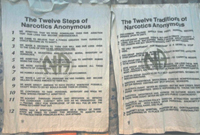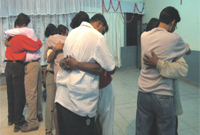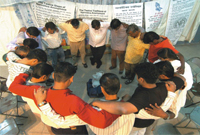| |
 |
| hanks to Narcotics Anonymous, a group of hopelessly addicted people are miraculously healing themselves of their scourge via a collective will |
| |
By Nishtha Shukla |
| |
|
|
I would go down to shady slums wearing torn jeans, smoke in hand, doped and clueless. It surprises me I wasn't raped.” Twentysomething Krutika can joke about it with her peers today. But some years back, when friends in class were frantically preparing for their Class XII examinations, another madness kept Krutika busy. “Smack”, she says. “By then I had started taking smack regularly. It never struck me as bad.” |
| |
Like many other urban youngsters, Krutika and her friends started doing drugs at parties after some drinks and a few cigarettes. “I liked it and did not stop to think. Fortunately, it took me only a year and a half to realise that I was in deep trouble.” When she needed money to buy her stuff, she would steal from home, flick equipment from her institute, even constantly search for money from relatives. She recalls kicking her aunt once because she hid her money somewhere so Krutika would not find it. |
For a youngster who should have been starting out in life on an ambitious note, Krutika became a social recluse of sorts. She was constantly fighting with her parents and would be continually on one self-pity trip or another. Her only buddies were drug addicts who lit up with her. She realised she was an addict in a year and a half of using it and made an attempt to give up every once in a while. But the trouble with being a drug addict is it is as easy to get hooked on to everything else. |
 |
So when Krutika tried to quit smack and had severe withdrawal symptoms, she got addicted to substances like intravenous injections. The lucky thing for her was the desire within to stop abusing herself. But as with all addictions, she couldn't live without it. |
|
| |
|
 |
While attempting to get over her addiction, she was trying detox, visiting rehab centers, and was being taken to psychologists. At her sessions with the psychologist she read some brochures on Narcotics Anonymous but the doctor discouraged Krutika. “This is not the right place for women. Just continue with our treatment and you will be fine.” But it didn't work. She finally got help from the people one would least expect—friends who had been addicts themselves. |
| |
These were friends at NA who encouraged her to come to their meetings. “Keep coming back,” they said. It is a one-liner that has worked for everyone at NA. When the addict goes through his toughest times, wondering ‘why me' or ‘how will I ever improve', it's then the concept of a family meeting kicks in. Delhi-based psychologist Arpita Anand believes in the concept, “NA is a shared concept that brings about a support that works wonderfully.” |
| |
Before they came here, they felt lonely and thought themselves the susceptible group in society. But when people come to NA, they realise it is simply a group of people like themselves who come together every evening to talk about their itches. These are people who were addicted to drugs for one reason or another. And they tried everything to get rid of the addiction. They eventually landed in a place where they met a group of people who had undergone fear, addiction and a trauma similar to theirs. They also had another thing in common—the desire to stop using drugs. |
 |
|
|
|